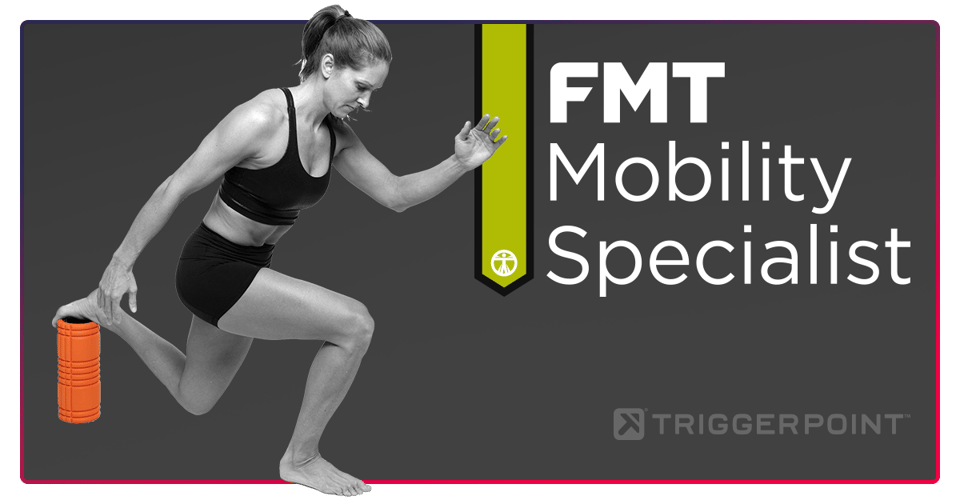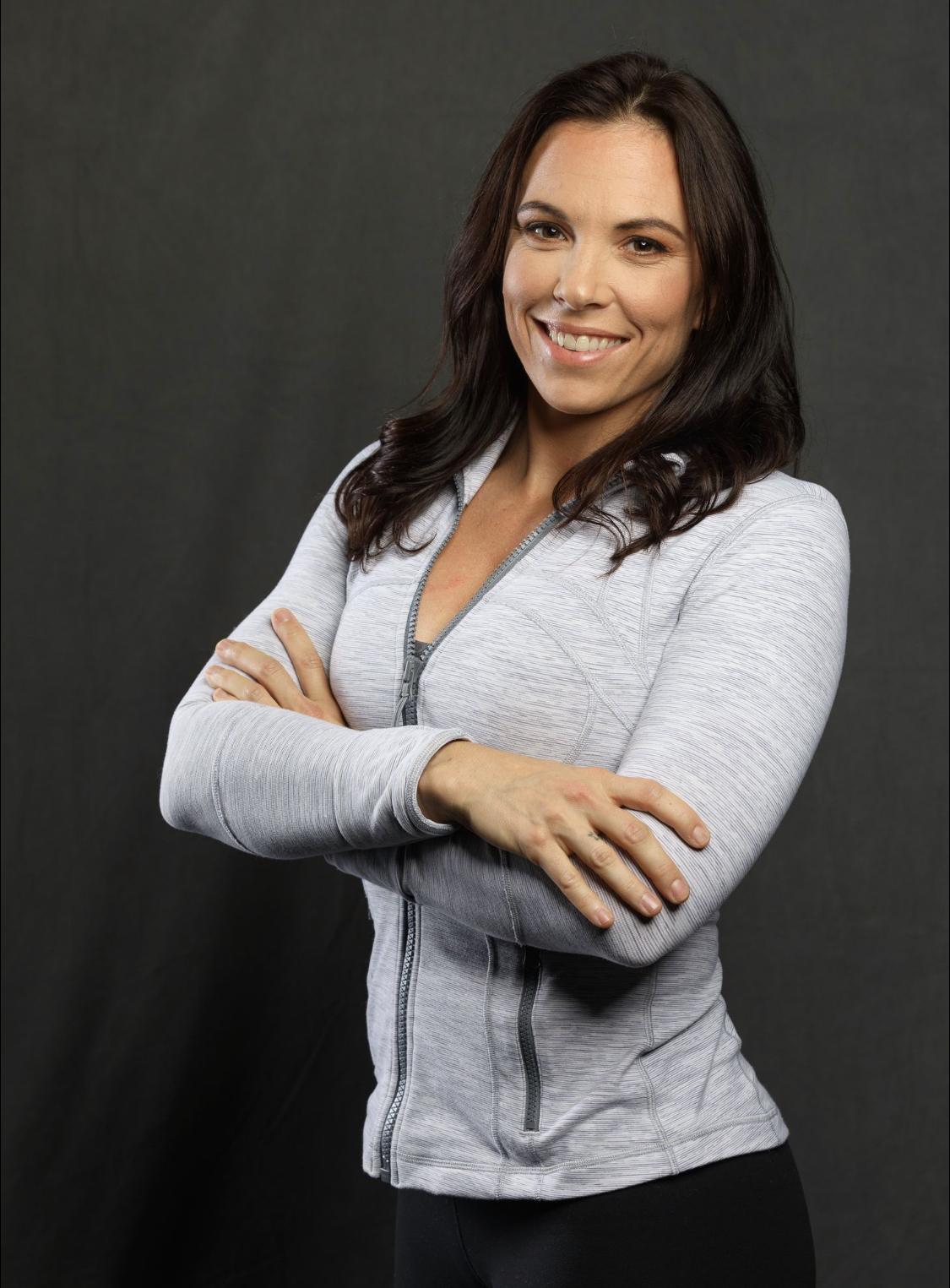FMT Mobility Specialist
by Dr. Meghan Helwig

Description
FMT Mobility Specialist Course is an evidence-informed self-myofascial rolling course that advances students’ understanding of mobility techniques for their patient’s and client’s needs. FMT Mobility Specialist offers a practical framework and a systematic approach for determining why, how, when and where to roll for movement preparation, movement recovery or pain relief. Assessment systems will be presented examining concepts of joint by joint mobility, stability and fascial integrity. These systems will be utilized to direct fun and innovative lab experiences throughout the course.
FMT Mobility Specialist methodically integrates a review of the current literature and demonstrates the science behind rolling for improved rehabilitation or performance outcomes. Current concepts such as rolling with percussion/vibration will be explored with innovative solutions provided for common movement, performance and recovery challenges.
This course is intended for health and fitness professionals with all levels of prior self-myofascial rolling experience.
Functional Movement Training (FMT) Certification courses are taught by industry leading experts in movement assessment, performance and rehabilitation.
Note: Tools are not provided with this course.
Learning Objectives
- Identify and discuss the history of self-myofascial release/rolling (Self-MFR) techniques.
- Compare and contrast current foam rolling research studies.
- Discuss and critique neurological vs mechanical physiological effects of self-myofascial rolling techniques.
- Compare variables of ‘how’ we roll, including depth, duration and rate of rolling and the effects on the underlying tissue and patient/client outcomes.
- Compare variables of ‘why and when’ we roll, including for movement preparation, movement recovery and pain relief.
- Discuss, screen and apply joint by joint mobility and stability MFR techniques to explore a system of ‘where to roll’.
- Discuss, screen and apply facial chain mobility MFR techniques to explore a system of ‘where to roll’.
- Discover and experiment with various self-myofascial release application techniques for common complaint locations such as spine, upper and lower extremities.
Course Content
| FMT Mobility Specialist | Module |
PT
AK, AZ, DE, GA, HI, ID, IN, MI, MS, MO, MT, NC, ND, PA, SC, RI, TN, VA - FMT Mobility Specialist meets continuing education requirements for these State Physical Therapy Boards by virtue of ATPTA KY (FMT Mobility Specialist 6 Category 1 contact hours), Approval Number #302-APTAKY-2024.
AL, CO, CT, IA, MA, ME, MN, NH, OR, SD, UT, WA, WY - FMT Mobility Specialist meets continuing education requirements for these State Physical Therapy Boards
DC/IL - FMT Mobility Specialist (6 contact hours) meets continuing education requirements for these State Physical Therapy Boards by virtue of a National University of Health Sciences approval. NUHS is recognized by the Secretary of States Department of Education.
KY - FMT Mobility Specialist has been approved by the APTA Kentucky, A Chapter of the American Physical Therapy Association, Approval #302-APTAKY-2024 for 6 Category 1 contact hours.
ATC
(BOC Approved provider # P8570) is approved by the Board of Certification, Inc. to provide continuing education to Certified Athletic Trainers. This program is eligible for a maximum of (6 hours/CEUs FMT Mobility Specialist Category A). ATs should claim only those hours actually spent in the educational program.
LMT
FMT Mobility Specialist (6 CEs) is approved (#179) by the National Certification Board for Therapeutic Massage & Bodywork (NCBTMB) as a continuing education Approved Provider
OT
AR, HI, ID, MA, ME, MI, NE, ND, SC, TX, VA, WI OT - FMT Mobility Specialist meets continuing education requirements for these State OT Boards.
Dr. Meghan Helwig

Dr. Meghan Helwig graduated with her Doctorate in Physical Therapy from Rutgers University. A native of Morris County, NJ, Dr. Helwig earned a finance degree from Villanova University where she was the starting goalie for 4 years for the Div. I Big East Field Hockey Team.
An athlete her entire life Dr. Helwig has a competitive mindset and understands the demands sport and life place on the body. She has numerous “tools in her toolbox” and has combined concepts and techniques such as ART, SFMA, NKT, DNS, TPI, Rocktape IASTM/Blades, Kinesiology Taping, and cupping to create her own unique system for assessment and intervention. She utilizes these tools and techniques to assess and treat her patients as a whole while uncovering the underlying “WHY” behind her patients' symptoms.
Hour One
- Welcome & introduction of instructor and course participants
- Overview of outline of the course; introduction of topics that will be covered as well as description of practical lab experience and presentation of case studies.
- What is FMT? Functional Movement Training
History of Self-Myofascial Release (Ch 1)
- Past and future rolling techniques, trends and movements
- Typical settings where students may have previously seen use of Self-MFR
- Foam Roller, pre and post workout
- Stick Massager, recovery concepts
- Mobility Ball, trigger point concepts
- Vibrating Foam Roller, enhancing inputs and neurological priming
New Science of Foam Rolling (Ch 2)
- Neurologic vs Mechanical Effects of Self-Myofascial Rolling
- Rolling concepts of influence on tissues and brain of person rolling
The Mechanical Effects (Ch 3)
- Mechanical Effects of Self-Myofascial Release techniques
- Shear and Compression Mechanics of skin and underlying tissues
- Musculoskeletal Ultrasound Tutorial and demonstration
- Differentiating Densification vs Fibrosis Tissue Restrictions
- Debunking myths of breaking up fascia, research review
The Neurologic Effects (Ch 4)
- Neurophysiological Effects Self-Myofascial Rolling techniques
- Introduction of concept of Body Maps with Clear and Faulty Representations
- Communication channels to the Brain via Skin and Fascia
- Review of Touch Science and its role in foam rolling
Psychosocial Effects (Ch 5)
- Using MFR as a layer in treatment variability to produce varied psychosocial effects
Review of Equipment (Ch 6)
- Rollers: equipment specs, typical rolling approach, unique rolling techniques
- Mobility Balls: equipment specs, typical rolling approach, unique rolling techniques
- Mobility Sticks: equipment specs, typical rolling approach, unique rolling techniques
- Vibration: equipment specs, typical rolling approach, unique rolling techniques
Hour Two
Safety with Self-MFR (Ch 7)
- Reducing risks involved in self-myofascial release (foam roller, sticks, balls)
- Relative and Absolute Contraindications to Foam Rolling
The FMT System (Ch 8)
- Technical and Practical Approach to Rolling Techniques
- How, Why, Where, Application and Performance Considerations
- How to Roll methodology and technique
- Why to Roll, indications and philosophy
- Where to Roll, Joint by Joint and Fascial Chain Systems
How We Roll (Ch 9)
- How Variables
- Depth Parameters to consider when rolling
- Duration Parameters to consider when rolling
- Rate Parameters to consider when rolling
- Research Influence on How Technique
Why and When We Roll (Ch 10)
- Why and When Variables
- Movement Preparation (Pre-activity) Tech Specs
- Movement Recovery (Post-activity) Tech Specs
- Pain Management Rolling Tech Specs
- Research Influence on Why Technique
Where We Roll (Ch 11)
- Where Variables
- Location Approaches
Hour Three
Joint by Joint Mobility Rolling (Ch 12)
- Screen, Techniques, Re-Screen System
- Research Update on Mobility Concepts
- Introducing Vibration for Mobility Concepts
- Mobility Intervention Tactics
- Lower Limb Region
- Upper Limb Region
- Neck Region
Hour Four
Joint by Joint Stability Rolling (Ch 13)
- Screen, Techniques, Re-Screen System
- Research Update on Stability Concepts
- Feeling Tight, Mechanical or Neuro-Defense Concepts
- Stability Intervention Tactics
- Base of Support Planar Challenges
- Vibration Reaction Challenges
- Scapular, Midline and Knee Zones
Hour Five
Fascial Chain Rolling System (Ch 14)
- Fascial Chain Anatomy
- Skin and Fascial Interface and Its effects on movement
- How to Screen Fascial Chains
- Posterior Chain, Screen, Techniques, Re-Screen
- Lateral Chain, Screen, Techniques, Re-Screen
- Functional Chain, Screen, Techniques, Re-Screen
- Arm Chain, Screen, Techniques, Re-Screen
Hour Six
Integrated Movement Strategies (Ch 15)
- Integrated Rolling with Vibration
- Literature Review on Performance and Foam Rolling
- Performance Indicators, Strength, Flexibility, Sprint, Jump
- Mobility Stack Techniques and lab experience, with instructor feedback
- Stability Stack Techniques and lab experience, with instructor feedback
- Performance Stack Techniques and lab experience, with instructor feedback
- Corrective Tactics
- Base of Support Tactics, Reaction and Balance Tactics, Functional Performance